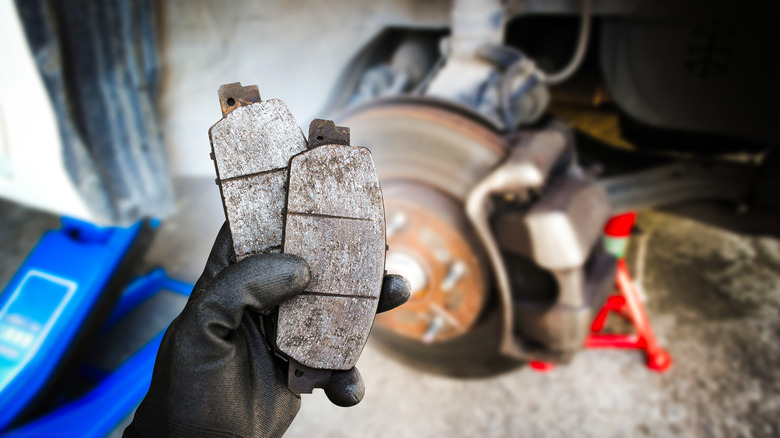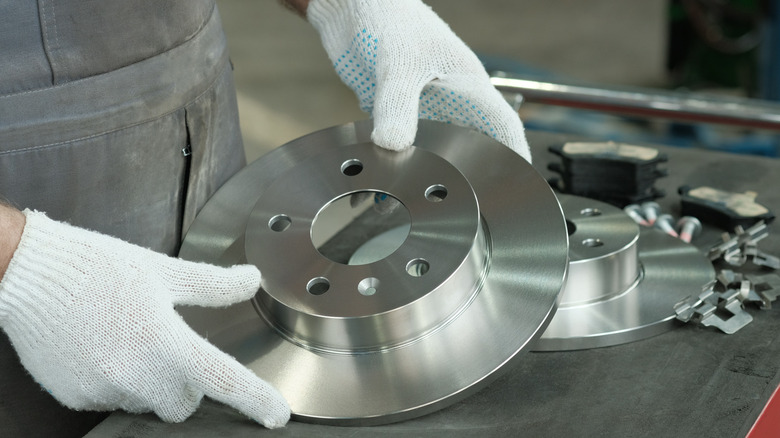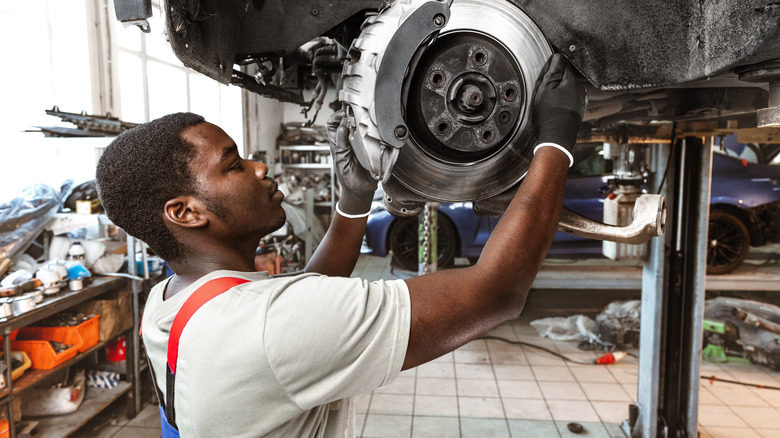Should You Grease Your Car's Brake Pads?
One thing you're sure to find in a dedicated motorist's garage is grease because, at its heart, a car is a sophisticated collection of metal components. Many of which, of course, work in close contact to each other. Naturally, this is going to mean a lot of friction in places. Friction isn't necessarily a bad thing. After all, a car couldn't brake at all without the friction between the brake pads and the brake disks. The production (and effective dissipation) of heat between these two components is key to the vehicle stopping in good time when you hit the brakes. With grease typically being used to reduce friction (such as in other parts of machinery like the chains of bicycles), those who have never used it on their car's brake pads are probably reluctant to do so.
There's a good reason to be very wary, as careless application of grease can limit effectiveness or even outright prevent the brake system from functioning. Used sparingly and correctly, though, a little grease on the right area of the brake pads can facilitate smoother performance. This can prevent noisy brake operation and keep your brakes running smoothly. The key is targeted and minimal application of a specific grease or broader lubricant intended for use on these components. Sometimes you'll need to get rid of your brake pads, but the proper application of grease can help extend their lives.
The vital role of the brake pads
The crucial thing to remember is that some of the little maintenance jobs you do every day can ultimately save you a lot of money in the long run. It can be costly to replace most components of a vehicle, and so any TLC you can give anything — from the battery to the bulbs — to extend their lives is typically an excellent idea. This extends, too, to the brake pads. Long-time British insurer and breakdown coverage provider RAC deems them to be a part of "perhaps the most important safety feature in our cars," and notes that you can make anywhere from 30,000 to 70,000 miles before your brake pads will need to be replaced. The great range is partly because wear and tear on them is heavily influenced by one's driving style, with more aggressive braking tending to wear them down more quickly. The driver will often be alerted to worn brake pads via a direct warning on their vehicle's display, and efficient and smooth operation can help to keep them in good working order longer.
During fitting or re-fitting, brake part manufacturer Wagner recommends applying an appropriate grease to the t-heads while installing the brakes, plus the contact spots between the caliper and brake pads as well as the brackets. It's critical, the outlet goes on, to ensure it's a grease that is intended for this specific purpose, as this will mean it's temperature-resistant enough not to be melted by the heat of the brakes' operation and spread where it shouldn't. Another thing to bear in mind is that the climate, driving surface, and your own habits have a significant effect on grease, with factors such as potential contamination to consider as well as the temperature.
To grease or not to grease
As previously warned, though, grease is far from the answer to every issue regarding the connected parts of the brake system. Drivers should be especially wary with areas such as the rubber connections of the calipers because, by the nature of grease, it can attract small particles of dirt and grime during the vehicle's operation. As with so many things in a motorist's toolkit, then, grease can be highly beneficial if applied to the right spot for the right reasons, but an inexperienced hand could easily do more harm than good. Replacing the pads is often work for a professional. Also note the materials your brake pads are made from, as this can impact how long they last.
Typically, greasing the brake pads isn't essential to their operation. Whether it's appropriate for your vehicle in particular will depend on how it's operating, being of particular benefit after longer drives in coastal regions. Grease is frequently used, as it is in other areas such as the home, to manage any pesky squeaking noises. Like a rusty door hinge, there are few noises as likely to grind on one's nerves over time, and the careful application of grease to components away from the surface, such as the caliper guidelines, can put a swift stop to that. Similarly, it's very helpful to keep the potential applications of grease in mind when replacing the brake pads. By doing so, you ensure a smoother application and fit without risking the all-important properties of the brake surface itself. You can also prevent and address brake drag (and the resultant drop in fuel efficiency) using grease.


